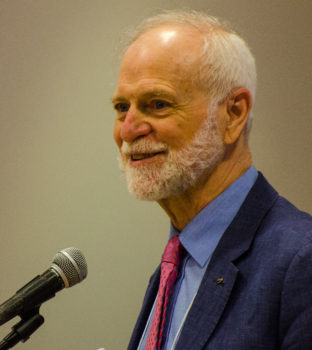The 72nd Bahá’í National Convention
From April 29 to May 2 – the earliest days of the Nine Year Plan – delegates to the National Convention gathered at the Toronto Bahá’í Centre to consult with and elect the National Spiritual Assembly. Due to the pandemic, it has been three years since the last Convention took place, although the election was carried out through alternate methods. Since delegates last convened, the global Bahá’í community completed two of the House of Justice’s Plans, and the Cause of God entered the third epoch of the Master’s Divine Plan and the sixth epoch of Formative Age of the Faith. The potent spirit of all that had passed was palpable.
This year is also noteworthy as those called to serve on the National Spiritual Assembly will go on to elect the Universal House of Justice, completing a worldwide election process starting at the unit level with the election of the delegates. Counsellors Ayafor Temengye Ayafor and Borna Noureddin addressed the Convention several times. Also present were special guests Dr. Firaydoun Javaheri, former member of the Universal House of Justice, and his wife, Mrs. Vida Javaheri.
The delegates focused their consultation on the 30 December 2021 message to the Conference of the Continental Boards of Counsellors and this year’s Ridván message. Photo: Payam Shodjai
The delegates focused their consultation on the 30 December 2021 message to the Conference of the Continental Boards of Counsellors and this year’s Ridván message, exploring a series of themes prepared by the National Assembly, all connected to teaching the Cause. A delegate from Ontario commented, “In studying the Ridván message, the words chosen are purposeful and the images are there to guide us.” The message describes how the “ark of the Cause” has sailed through many storms, which brought to mind the severe crises facing humanity. A delegate from P.E.I. familiar with sailing commented that, “In a storm, the safest route is directly into the wind.”
A delegate from Ontario noted that while Bahá’ís are not immune to the tests of the Major Plan of God, these same forces are heightening receptivity, increasing the number of friends interested in attending devotional gatherings, for example. And now, at the beginning of this nine-year endeavour, the ark of the Cause is “bound for a new horizon.”
Some questions the National Assembly posed to the delegates were: “How is experience growing in working with families and groups?” and “What is needed to enable the friends to take a more expansive view of the training institute?”
The delegates commented on the new understanding called for by the Nine Year Plan, from advancing the process of entry by troops, to unleashing the society-building power of the Faith. Dr. Noureddin remarked that leaps in consciousness often warrant the re-examination of fundamental concepts. He asked the delegates, “What does it mean to us to be a Bahá’í?” Another concept Dr. Noureddin asked the delegates to re-examine was teaching – a concept that has advanced considerably as a result of implementing the methods and approaches of the training institute.
Counsellors Ayafor Temengye Ayafor and Borna Noureddin addressed the Convention several times. Photo: Louis Brunet
Delegates shared how the more expansive view from the House of Justice’s 30 December 2021 message has helped neighbourhood teams and networks of friends to engage entire families. A delegate from Ontario described how tutors local to the neighbourhood have extended the conversation of the institute to their parents, who are now participants. A delegate from Quebec explained how visiting individuals engaged in the institute and newly-enrolled in the Faith, and accompanying them to reach out to their friends and families, has expanded their vision.
Teaching Indigenous peoples was a theme close to the heart of the Convention, as many delegates expressed a desire that this be given particular attention. It was noted that although there have been challenges in the past, and there is much to learn, the Canadian Bahá’í community has strong experience to draw on, particularly with regards to devotional gatherings in many places, and in the neighbourhoods Harewood and Commercial Drive, both in British Columbia, where many Indigenous families are engaged in the institute process.
The spiritual empowerment of young people, as well as the generational scope of the Nine Year Plan, was also a thread in the consultations. Oppressive forces have been negatively impacting mental health, yet there were examples of how the educational process of the institute was helping youth navigate challenging circumstances. A delegate from British Columbia told a moving story about how a young person experiencing depression lit up when describing her junior youth group, saying “This is the best thing in my life!”
Advances in the functioning of Local Spiritual Assemblies – which are now thinking about the spiritual health of the entire population of their localities, not only Bahá’ís – was also noted at the Convention. Mr. Ayafor considered the functioning of Assemblies where members were brought to the Faith though the institute process and challenged the delegates to think about how processes can be set in motion to accompany growing numbers of friends to uphold Bahá’í Law.
Mr. Ayafor remarked, “Our conception of the Bahá’í community includes a wide variety of people, and it will be very difficult for Assemblies to counsel each individual.” He noted that creating a culture of visits and praying in our homes are steps toward this spiritually-charged environment. “Then such visits can be used to discuss guidance in a way that is not judgmental of each individual case,” he continued
The National Assembly noted with joy that there was a 25 per cent increase in donations to the National Fund. Dr. Noureddin encouraged the delegates to consider time and material means as expressions of love for God. “How do we incorporate love in this conversation on time?” he asked, “It is not about how little time we have, but what we do with it. What do we prioritize? When we bring ourselves to account each day, do we include how we used the minutes of the day? Approached in the perspective of learning, it’s capacity building!”

A letter from the Board of Trustees of Huqúqu’lláh in Canada, addressed to the Convention, was read, illuminating that Law’s profound spiritual and societal impact. Photo: Louis Brunet
A letter from the Board of Trustees of Huqúqu’lláh in Canada, addressed to the Convention, was read, illuminating that Law’s profound spiritual and societal impact. It was also acknowledged that many present had lost loved ones over the last three years. The Convention offered prayers for these recently-departed souls, including Mr. Bahram Gustaspi, who was serving as a member of the Board of Trustees of Huqúqu’lláh in Canada at the time of his passing.
A letter from the National Convention of Iceland honouring Canadian pioneers for establishing early communities in that land, which enabled the formation of the first National Spiritual Assembly 50 years ago, was read to the Convention. This message reminded the delegates of Canada’s long-standing legacy in the field of international pioneering and the necessity to befittingly heed the new pioneer call of the Universal House of Justice.
Of the 171 delegates representing Canada from coast to coast to coast, there was 100 per cent participation in the election of the National Assembly. The head teller reported that 146 ballots were cast in person; 12 by mail and hand delivered; 11 through e-voting, and two by phone. The members of the National Spiritual Assembly elected for the coming year are: Mehran Anvari, Deloria Bighorn, Zelalem Bimrew Kasse, Hoda Farahmandpour, Gerald Filson, Judy Filson, Ciprian Jauca, Karen McKye and Élizabeth Wright.
John Ball, a delegate from Alberta, shared the following poem with the Convention, which he wrote 19 years ago – the first time he served as a delegate. It is titled “Nine of God.”
In love we see them,
Amongst us
Chatting, laughing, sharing,
Emanating such love
‘Til pulled by some celestial force
We penned their names.
Nine – of God.
Love, through flooding eyes averted,
Seized our hearts.
We stood and cheered as they stood before us.
On them, through us, God placed a trust.
We leave, their work begins.
For us, now, to love them back,
Arise to serve our Lord,
And win this land.
Several collective recommendations were made to the National Spiritual Assembly from the assembled delegates. The first was to approach the Universal House of Justice to express conviction that the Canadian community would arise with joy if chosen as one of the communities entering into consultations about building a physical structure for the institution of the Mashriqu’l-Ashkár. The delegates assembled wished to seek guidance on what is required for both local and national Houses of Worship.
Secondly, the Convention recommended the National Assembly review its contribution goals, with an eye to increasing them at the beginning of the Nine Year Plan in preparation for expenses to come, particularly with regards to properties, as projections indicate that 150 neighbourhood centres will be required by the end of the Nine Year Plan, up from the 16 currently in operation.
The third recommendation was that the National Spiritual Assembly give renewed attention to teaching efforts with Canada’s Indigenous populations, and consider the possibility of a new mechanism that could help the community consolidate and disseminate learning in this regard.
Finally, with regards to Local Spiritual Assemblies, there was a desire for national support in learning about fostering spiritually-charged environments in the community that assist individuals to adhere to Bahá’í Law and build capacity in families facing difficulties.
Several collective recommendations were made to the National Spiritual Assembly from the assembled delegates. Photo: Payam Shodjai
In its closing remarks, the National Spiritual Assembly called to mind a passage from the House of Justice’s 2016 message to the Bahá’ís of the United States and Canada – the chosen recipients of ‘Abdu’l-Bahá’s Tablets of the Divine Plan:
The movement of your clusters to the farthest frontiers of learning will usher in the time anticipated by Shoghi Effendi at the start of your collective exertions, when the communities you build will directly combat and eventually eradicate the forces of corruption, of moral laxity, and of ingrained prejudice eating away at the vitals of society.
It seems that with the expansive vision of the Nine Year Plan, building on the accomplishments of the last 25 years, and the goal of releasing, in ever greater measures, the society-building power of the Faith, this time has now come.
Category: Elections








